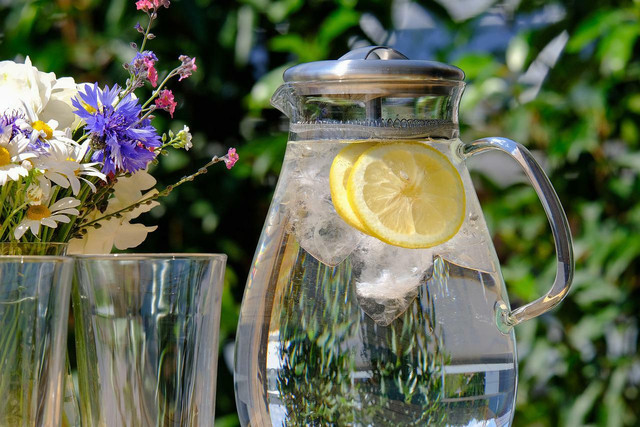Home remedies for bad breath can make all the difference to your self-esteem. Don't suffer, just try our ten simple, yet effective, solutions.
It’s likely we all know the feeling that comes from noticing we have bad breath (halitosis). We breathe into our hands and notice, often with horror, that others may also be able to smell what we do. The causes of bad breath may be many, and can include the foods we have eaten — or not eaten — or an infection of the mouth or throat.
Mask-wearing, during the pandemic, may also have exacerbated the problem. There are things we can do to reduce bad breath in the first place, which we’ll also tell you about below, but once we notice it is there, what can we do? Don’t worry, we have put together ten easy home remedies for bad breath, that will have you smelling sweet as a daisy.
Home Remedies for Bad Breath

(Foto: CC0 / Pixabay / NickyPe)
Some of these remedies are so simple, it’s just a case of remembering to add them into your daily life.
1. Drink more water. Water naturally flushes out your systems. Keeping your mouth hydrated is one of the best ways to cure bad breath. It’s important that you drink just water, and not carbonated drinks and juices. Drinking water keeps bacteria at bay, and leaves your mouth fresh.
2. Make your own fresh DIY mouthwash. Use it regularly to avoid bad breath, or upon noticing its unwanted arrival. This is an easy and ideal way to improve overall oral hygiene.
3. Gargle and rinse with warm salt water. This works the same way as the mouthwash, and is easy to administer on short notice. Use a small amount of salt, else you may feel a little sick, and be careful not to swallow it, as this may induce vomiting. Try a quarter of a teaspoon to half a glass of water. Swish and spit out. Repeat when needed.
4. If the issue may lie with eating garlic, and/or onions, you can try and neutralize the odor with apple cider vinegar. Again, add a little to half a glass of water, and gargle with it, rather than drink it.
5. You could also try chomping down on some cloves. This may be a bit more drastic, but cloves will freshen the breath almost immediately, and again combats bacteria. Highly diluted, clove essential oil can also be used as a soothing mouthwash. Fennel seeds, and cinnamon sticks will also do the job — even some dentists swear by this advice.



(Foto: CC0 / Pixabay / balt)
6. Eat more fruit and veg. This is solid advice anyway, as we all know the many benefits of fruit and vegetables, but maybe you didn’t know they will keep your breath fresh, and help once bad breath has come calling. Quick fixes include biting on an apple or carrot stick. Chewing on soft fruits such as oranges increase saliva production, again hydrating the mouth, and they smell lovely. Try our quick fruit salad recipe for a tasty summer treat.
7. Chew on parsley. This has long been known to counteract bad breath, and many curry lovers know it also removes the after-effects of a highly spicy meal. The taste is more neutral than cloves, so may be a softer approach to relieve symptoms.
8. Clean your teeth and tongue. It may sound obvious, but could be your first go-to for bad breath. Many people wouldn’t think to lightly brush their tongue, but this may get rid of lingering residue and bacteria. Rinse your mouth and the toothbrush afterwards. Learn why and how to clean your tongue with scraper or home remedies in our guide on the topic.
9. Drink green or black tea. Both contain polyphenol, which is a property that can prevent the formation of bacterial growth, thus reducing bad odors.
10. Drink a fennel or anise tea, or a combination of the two. In fact, many herbal teas may have the desired effect, and can help with other issues too, such as stress or nausea.
How to Avoid Bad Breath in the First Place



(Foto: CC0 / Pixabay / slavoljubovski)
Having a regular mouth-care routine, along with some possible changes in eating habits, as mentioned, can make all the difference when it comes to your breath. We all want to smell great, so following some simple steps can eradicate the nuisance of halitosis. So what are the tips?
- Stay hydrated.
- Brush your teeth for at least 2 minutes twice a day. Include a gentle brushing of the tongue, and rinse your mouth and toothbrush afterwards.
- Use toothpaste and a good mouthwash.
- Floss regularly.
- Get regular dental check-ups.
When those tips don’t do the trick for you, you might have underlying health issues that cause the halitosis. They might have nothing to do with your oral hygiene, but rather be a stomach issue — even though this is only the case in less than one percent of cases. The esophagus, the intestine, or tonsil stones can also be the cause of bad breath, in rare cases, and are worth checking out with your doctor.
Read more:
- Zero Waste Toothpaste: The Growing Trend Towards No-Waste Pastes
- 6 Tips on How to Stop Hair Shedding
- How Often Should You Replace Your Toothbrush?
Important Information regarding Health-related Topics.
** Links to retailers marked with ** or underlined orange are partially partner links: If you buy here, you actively support Utopia.org, because we will receive a small part of the sales proceeds. More info.Do you like this post?






